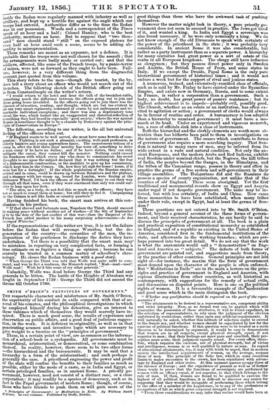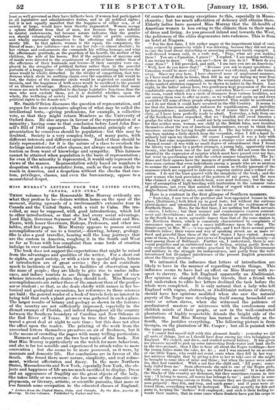SMITH O'BRIEN'S PRINCIPLES OP GOVERNMENT. * THE respectable character and misfortunes
of Mr. Smith O'Brien, the superiority of his conduct in exile compared with that of se- veral of his eomates and the philosophical investigations in which he employed himself during his detention, give an interest to these volumes which of themselves they would scarcely have in- spired: There is much good sense, the results of experience and. observation on public affairs, and a good deal of judicious sugges- tion, in the work. It is deficient in originality, as well as in that penetrating acumen- and inventive logic which are necessary to give weight to a treatise on the "principles of government.' These, in a certain point of view, are as common as the informa- tion of a school-book or a cyclopsedia. All governments must be monarchical, aristocratical, or democratical, or some combination thereof. In reality, however, there seem to be two other forms —the hierarchical and the bureaucratic. It may be said that a hierarchy is a form of the aristocratical ; and such perhaps is generally the case. A priesthood engrossing the power and profit of the state will confine the benefits to their families as much as possible, either by the mode of a caste, as in India and Egypt, or certain privileged families, as in ancient Rome. A priestly go- vernment, however, need not consist of a distinct race, or a close Corporation: it may readily be a species of democracy, such as in fact is the Papal government of modern Rome ; though, of course, those who have friends to push them on will gain more of the
• Principles of Government; or Meditation. in Exile. By William Smith O'Brien. In two volumes. Published by Duffy, Dublin.
good things than those who have the awkward task of pushing' themselves.
However the matter might look in theory, a The priestly go- vernment does not seem to succeed in practice. The Sews got tired of it, and wanted a king. In India and Egypt a sovereign was also found necessary, if he were only nominally a king. We do not know enough of the old Etruscans to speak with certainty of the power of the priesthood in the state ; it was probably very considerable. In ancient Rome it was also considerable, but rather as a party instrument than as a separate power. A hierarchy for many centuries had great power as a sort of estate of the realm in all European kingdoms. The clergy still have influence as clergymen ; but they possess direct power only in Sweden and Austria, the British House of Peers and some states in Italy. If we except the Druids, Papal Rome is the only pure hierarchical government of historical times ; and it would not endure a week but for the support of rival and jealous states. A numerous, trained, and extensively-ramified elegs of officials, such as is said by Mr. Finlay to have existed under the Byzantine Empire, and exists now in y, Russia, and to some extent in France, is rather a corporation than a government. Such a body, no doubt, has great power of passive resistance ; but its highest achievement is to impede—probably evil, possibly good. The Church, whether as an estate or an institution, has ofteri ex- cited to agitation or action; a government of clerks would always be in favour of routine and order. A bureaucracy is less adapted than a hierarchy to unmixed government ; it must have a mo- narch at its head. Under an experienced and vigorous monarch, too, a race of officials sink into a class of instruments.
Both the hierarchal and the clerkly elements are worth more at- tention than has hitherto been paid to them in investigations on the nature of government. The causes which eontribute to forms of government also require a more searching inquiry. That free- dom is natural to many races of men, may be inferred from its wide extent in a rude and natural condition. Not only the an- cient Europeans, and the modern Arabs and Red Indians, exhibit real freedom under nominal chiefs, but the Negroes, the hill tribes of India, the peoples beyond the Ganges, in the Himalayas, and the tribes of the Caucasian range, possess in theory and often in practice the germs of a free system and self-government in their village assemblies. The Hungarians did and the Russians do possess a species of county organization, not unlike that of the- counties of old England. These seem aboriginal. Yet the first traditional and monumental records show us Egypt and Assyria under regal if not despotic 'government. The same may be in- ferred, but with less certainty, of India and China. How came, these monarchies to have been established, when many tribes under their rule, except in Egypt, had at least the germs of free- dom?
These questions are not entered into by Mr. Smith O'Brien. Indeed, beyond a general account of the three forms of govern- ment, and their received characteristics, he can hardly be said to discuss the principles of government at a11.. The book is a plain and practical exposition of constitutional monarchy as established in England, and of a republic as existing in the United States of America, considered first in the fundamental institutions of the state, and afterwards in the working branches-; which are per- haps pursued into too great detail. We do not say that the work is what the anatomists would call a " demonstration " on Eng- land and America as "subjects." The defects of both forms of- government are pointed Out, and suggestions made from theory, Or the practice of other countries. General principles are not lost sight of—for instance, the maxim that the fotin of government must depend upon the character of the people is often enforced. But "Meditations in Exile" are in the main a lecture on the prin- ciples and practice of government in England and America, with copious illustrations from other countries, as well historical as contemporary, with suggestions for the remedy of actual evils, and discussions on disputed points. Here is one on„the political rights of women. It is a favourable example of theyiaoderation and good sense which in the main distinguish the book.
"Whether any qualification should be required on the part of the repre- sentative
"The attainments to be desired in a representative are, competent ability and strict integrity. Now' as no formal test can be applied which will guarantee the possession of these attributes, it will be found expedient, is the selection of representatives, to rely upon the judgment of the electors unfettered by restrictions, rather than upon any artificial requirements. It will naturally be asked, whether this latitude of selection ought to extend to the female sex, and whether women should be capacitated by law for the exercise of political functions. If this question were to be treated as a mere theorem to be determined by argument, it would be easy to demonstrate that women are in all respects, except physical strength, equal, if not. superior to men ; that their feelings are more pure and unselfish, their per- ception more acute, their judgment equally sound. For every- office, there- fore, which requires the exercise, net of physical strength, but of virtue and intelligence, woman is as well qualified by nature as man. In regard of educational attainments, too, it may with truth be urged, that in modern society the intellectual acquirements of women, on the average, surpass those of men. The principle of the Salle law, which in some countries limits to males succession to the crown, has been repudiated with advan- tage by England and other states. At this moment queens occupy-three of the thrones of Europe ; and the experience of present as well as of fortner times tends to prove that the functions of sovereignty are performed by women with an efficacy equal, if not superior, to that which belongs. to the rule of man. If, then' women are found to be qualified to exercise the highest of all political functions, it is difficult to discover any reason for supposing that they would be incapable of performing those which belong to the office of a member of the Legislature, or to any of the professions or occupations of life in which great corporeal strength is not required.
"From these considerations we may infer that realms would have been at
least as well governed as they have hitherto been if women had participated in all legislative and administrative duties, and in all political rights ; but it is not equally manifest that the happiness of either sex, or of society at large, would have been thereby augmented. Women occupy a sphere different from that of men, not because they are inferior in mental endowments, but because nature indicates that the gentler sex should voluntarily withdraw from the strife of public exertion, and wholly surrender themselves to the affections and duties of do- mestic life. In that sphere, woman is the equal, the companion, the friend of man ; her influence—not to say her rule—is almost absolute ; by her virtues and endearments she commands his willing homage, and wins his affectionate gratitude, as the guardian of his hearth, the mother of his children' the wife of his bosom. But if the aspirations of matrons and of maids were directed to the acquirement of political fame rather than of the affections of their husbands and lovers---if their energies were em- ployed in the struggles of political faction rather than in the peaceful pursuits of a happy home—the relations at present subsisting between the sexes would be wholly disturbed. In the rivalry of competition, that ten- derness which sheds its soothing charm over the asperities of life would be lost, the duties of the domestic circle would be neglected or confided to menials, and the happiness of both sexes would be sacrificed to the pursuit of an illusory advantage. Hence, although it be undeniable that many women are much better qualified to discharge legislative functions than the men who now exclude them, yet it is doubtful whether, upon the whole, the wellbeing of society would be promoted by the concession of political rights to the female sex."
Mr. Smith O'Brien discusses the q.uestion of representation, and argues for the more extensive adoption of what may be called the intellectual tests,—giving professions, for example, a collective vote, so that they might return. Members as the University. of Oxford does. He also argues in favour of the representation of a minority having come to that conclusion before Lord John Rus- sell's Bill of 1854 appeared. The fundamental principle of re- presentation he conceives should be population: but this may be doubted. Society is a very complex body, of many parts, with different interests and different opinions. Each of these should be fairly represented ; for it is the nature of a class to overlook the feelings and interests of other classes, not always so much from in- tention as from want of knowledge and sympathy. This fairness cannot be attained when population is the basis of representation ; for even if the minority is represented, it would only represent the views of the masses. Representation solely based on numbers is despotism with a representative form, such as they seem likely to reach in. America, and a despotism without the checks that cus- tom, privileges, classes, and even the bureaucracy, oppose to a monarchical despot.



























 Previous page
Previous page